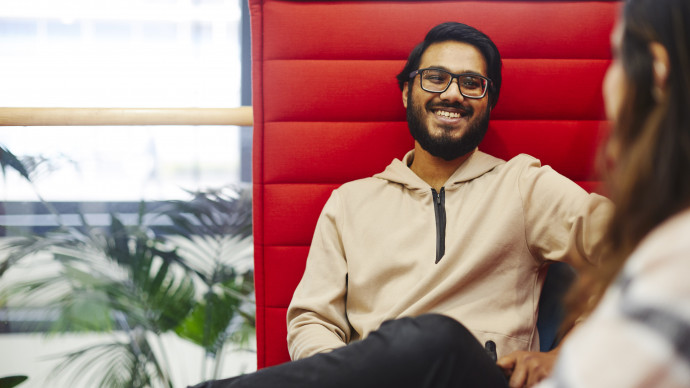
Study with us
Research pathways and funding opportunities to study at the world-leading Musculoskeletal Science and Sports Medicine research centre.
About our research
Research opportunities
You can study at MSc, MPhil and PhD level within the Musculoskeletal Science and Sports Medicine (MSSM) research centre.
We have funded and self-funded opportunities, for full and part-time study, and are always willing to support candidates preparing applications for external funding.
If you study with us, you’ll have the opportunity to take part in world-class research, studying human movement in its widest sense - from movement impairment induced by chronic disease, through healthy ageing, to elite sport.
We use state-of-the-art techniques to study the structure and function of cells, molecules and genetics, through musculoskeletal physiology to whole-body human biomechanics.
If you have completed your PhD, you may be able to join the centre through a fellowship or apply for a research job.
Study with mssm
-
Self-funded opportunities - MSc by Research
An alternative to the taught pathway of MSc Sports Science, the MSc by Research can be studied over one year (full-time) or two years (part-time).
You will complete an MSc level research project, guided by a team of our leading researchers, which will provide you with experience of:
writing a literature review
applied research methods
data collection in a topic at the forefront of sport and exercise sciences research
Contact: Prof Hans Degens or Dr Christopher Morse.
For more information on fees please visit our postgraduate research fees page.
-
PhD: Genetic characteristics of elite UK athletes (part of Project GENESIS)
We invite applications to study for MSc by Research or PhD, using and building upon a unique genetic resource.
Project Summary
We have led a large UK project to study the GENetics of Elite Status In Sport (GENESIS) which has collected a large cohort of DNA samples from elite UK athletes.
The extent of the genetic influence on success in sport is probably more than 50%. One main aim of the GENESIS project is to identify the specific genetic components that bring about this advantage for some individuals compared to others.
The genetic elements that influence sporting ability could act via effects on injury susceptibility, physiological performance, the ability to learn motor skills, the willingness to participate in heavy training and competition, and more. All else being equal, a genetic advantage on those aspects of human function and behaviour is an advantage to an athlete compared to his/her competitors.
The discovery of more genetic elements that influence sporting ability can potentially be applied to improve sports performance in the future, via strategies such as individualisation of training regimens and appropriate management of competition/playing load. It will also improve understanding of human biology, provide novel targets for the development of new treatments and facilitate targeting of interventions in old age and certain disease states where physical function becomes extremely limited.
The GENESIS cohort of elite UK athletes currently includes athletes from endurance sports, power sports and those sports with mixed metabolic demands. One of the largest athlete groups is from the sport of rugby.
Depending on the interests of the research student, the objectives for a particular project will be tailored accordingly. For example, a project could be conducted that focuses on injury susceptibility in rugby that has implications for musculoskeletal or brain health, or that focuses on performance in prolonged endurance events that have implications for cardiovascular health.
Contact: Prof Alun Williams
-
PhD: Role of advanced glycation end products in diabetes complications: investigation into diabetic neuropathy and myopathy
Project summary
Diabetes mellitus is a huge health concern. In 2014, it affected 422 million people worldwide (WHO 2014).
Diabetic patients have increased susceptibility to retinopathy, cataract, atherosclerosis, neuropathy (nerve damage), nephropathy, impaired wound healing, and myopathy (muscle damage). The hallmark of diabetes is hyperglycaemia which causes protein glycation and the subsequent formation of fluorescent and cross-linked advanced glycation end products (AGEs).
These AGEs can affect the function of biomolecules and can also have harmful effects following their interaction with their cellular receptors termed RAGE. Reducing sugars like glucose and glycated proteins also undergo autoxidation generating free radicals capable of damaging biomolecules. Accumulation of tissue AGEs together with increased free radical (reactive oxygen species ROS) activity underlie the pathogenesis of diabetic complications.
A key chronic complication of diabetes is diabetic neuropathy (nerve damage), myopathy (muscle damage), which presents as nerve-muscle damage, spasms, inflammation, fatigue, exercise intolerance, pain and paralysis. Diabetic myopathy is associated with neuropathy for example damage to the peripheral nerves which impairs the functioning of muscle fibres. Although AGEs have been implicated in nearly all of the major complications of diabetes, their role in muscle neuropathy and myopathy is still unclear.
The aim of this study is to investigate the effects of high glucose and AGEs on muscle cell function using our established co-culture model in vitro.
Contact: Dr Nasser Al-Shanti
Research: Sports protection equipment
Our research has informed new designs, testing methodologies and fabrication techniques for personal protection equipment to reduce injury rates in sport.Our research themes
-
![A swimmer doing front crawl, seen from below the surface of a swimming pool]()
Sports medicine and elite performance
Find out more -
![A close up of a researcher looking at gait analysis on a screen]()
Neurodegeneration
Go to research group -
![An older man being guided on the use of weights by a gym assistant]()
Musculoskeletal function in health and ageing
Find out more
Contact
Contact us
For general enquiries about MSSM postgraduate research degrees (self-funded, government scholarships or funded opportunities), please contact PhD coordinator Prof Hans Degens.







